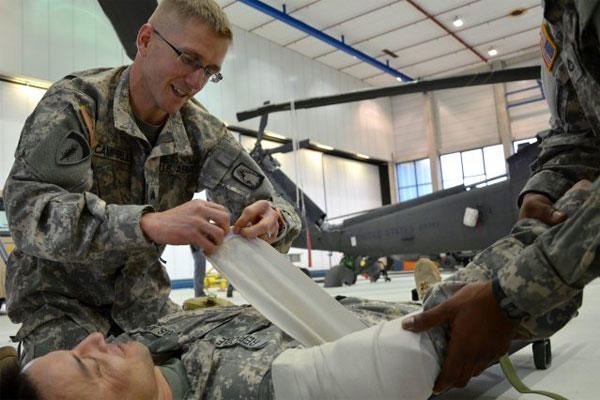No matter where you go in the Army, you're bound to find a medic. The second largest military occupational specialty in the Army, medics serve in almost every unit, staff our hospitals and go on every deployment to ensure the health and welfare of our Soldiers serving overseas.
All 68Ws, Army medics, graduate their advanced individual training as basic emergency medical technicians, EMT-B. This meets the minimum U.S. standard for basic life support and enables them to perform the basic tasks they will need at their units, but provides very limited opportunities for employment when they leave the Army.
To help further the skills of some of Fort Bragg's medics, Womack Army Medical Center partnered with Fayetteville Technical Community College to provide the opportunity for a pilot project, allowing them the opportunity to earn attend EMT-Paramedic training.
"I believe there is a need for us to continue our medical training in the Army," said Command Sgt. Maj. Carlos Gomez, senior enlisted advisor, WAMC. "Right now, it stops at EMT-Basic. The goal of this course is to provide additional training and enhance the skills, knowledge and readiness of our medics as they become paramedics."
Gomez said that the training level of 68Ws should reflect the roles they play in caring for service members deployed overseas.
"In deployed settings, medics, corpsman and medical technicians fill vital roles," said Gomez. "When they return stateside, they're often relegated to minor clinical and non-clinical roles due to the current certification level of an EMT-Basic."
Gomez said when looking for ways to increase training, FTCC was the obvious place to turn because they were already training civil affairs medics to become paramedics and had the infrastructure in place. He said the partnership is a great because it also gets the medics out into the local community as they complete their course work.
"The students complete 300 hours of clinical rotations at Cape Fear Valley Medical Center and 300 hours of 'ride along' time in an ambulance," said Bryant Stepp, the Emergency Medical Services instructor at FTCC. "This allows them to see experience different conditions and cases outside of what they normally see on Fort Bragg or overseas."
Stepp, who served as a Navy corpsman and has deployed numerous times, said that he appreciates to opportunity to help further the training of military medics.
"The military medics are trained well to do what they do, this helps give them additional training and the certification to back it up in the civilian world," said Stepp. "This is a fantastic opportunity for them and a great thing for the military as a whole for the care that they will now be able to provide."
Currently, there are 28 students in the inaugural class. Two of the students are civilian EMTs from Womack's Emergency Department. Four of the students are Army medics assigned to WAMC's ED. The remaining students are Soldiers representing various units across Fort Bragg, including the 82nd Airborne Division and the 20th Engineer Brigade.
Spc. Ignatius Acheampong is one of the WAMC medics attending the training. He joined the Army 18 months ago and aspires to continue his medical education to one day become a doctor or physician assistant. He said that he is excited about the opportunity to expand his skills so early in his career.
"This is a great opportunity and it will help become a better medic," said Acheampong. "I'm thankful that my leaders allowed me to attend. To have this training now will prepare me for what's to come as I get more experience my job and someday deploy."
While this training is a great addition for most of the Soldiers on Fort Bragg, it is a must for flight medics at the 82nd Combat Aviation Brigade. Being able to attend training here allows them to continue serving at their units instead of moving their Families to Fort Sam Houston, Texas to attend the paramedic course.
"For us, this is mandatory training to remain a flight medic," said Staff Sgt. James Soroka, 3rd Battalion, 82nd CAB. "This saved us from having to PCS (permanent change of station) twice in one year. Being able to come to FTCC instead gives my Family some much needed stabilization."
Gomez told the medics that he knew balancing their coursework with other duties they may have at their unit was hard, but that the certification they'll receive in the end is worth it.
"I knew it was going to be hard. Nothing worth any value is ever easy," said Gomez. "Just remember that you're the first, everyone is watching you. Your leaders sent you here because they believe in you. They support you. I support you."

© Copyright 2026 Army.mil/News. All rights reserved. This material may not be published, broadcast, rewritten or redistributed.




